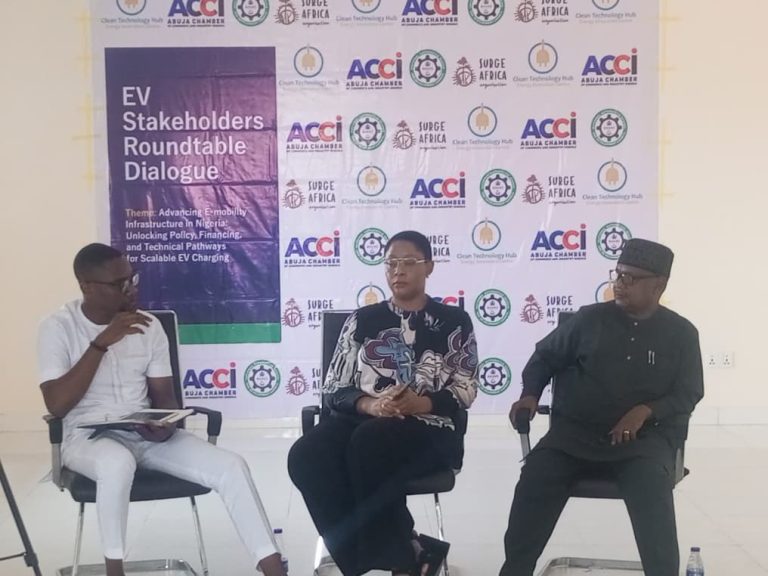Energy and transportation experts have called on Nigeria to urgently design and implement a clear and practical framework for building a nationwide electric vehicle (EV) charging network, warning that the country risks falling behind in the global shift toward clean transportation without deliberate action.
The experts made the call in Abuja at the EV Stakeholders Roundtable Dialogue organised by the Clean Technology Hub in commemoration of World Sustainable Transport Day. The event brought together policymakers, private investors, development partners, and technical professionals to examine how Nigeria can overcome obstacles limiting the growth of electric mobility.
The dialogue was organised in collaboration with the Abuja Chamber of Commerce and Industry Policy Centre, the National Automotive Design and Development Council and the renewable-energy advocacy group Surge Africa.
Speaking at the forum, Mr. Daramfon Bassey, Head of Programme for Energy Access at Clean Technology Hub, said Nigeria’s ability to transition successfully to electric mobility hinges on deploying a sustainable charging system suited to its local realities.
According to him, three pressing issues must be addressed: policy reforms that encourage private sector participation, financing models that work within an unstable power supply system, and technical frameworks for building infrastructure that can expand nationwide.
“No single organisation can deliver this transition alone. It requires active collaboration among government institutions, investors, energy providers and mobility companies. What we are trying to achieve is a shared understanding of how to build a responsive EV charging network for Nigeria over the next decade,” he said.
He explained that although Nigeria has begun developing policy frameworks for electric mobility, infrastructure remains underdeveloped and largely limited to experimental pilot projects scattered across the country.
“In many locations, charging stations exist only as demonstrations rather than commercial platforms. Without deliberate investment and consistent policy alignment, EV adoption will remain slow,” Bassey stated.
He stressed that Nigeria cannot adopt EV charging strategies used in advanced countries without adjustments, citing problems such as unreliable electricity supply, limited EV-ready fuel stations, rapid urban growth and inconsistent power access in rural areas.
“Countries in Europe and Asia built their EV ecosystem on stronger electricity networks. Nigeria must develop solutions that match its reality — including decentralised renewable energy sources like solar,” he noted.
Nigeria’s size and influence, Bassey added, makes its clean transportation pathway critical, not only for local progress but also for Africa’s long-term environmental goals.
“As Africa’s largest economy, Nigeria’s decisions will either slow down or accelerate regional transformation in sustainable mobility,” he said.
However, he highlighted several factors that place Nigeria in a favourable position to scale EV charging more quickly if the right strategies are introduced. These include high solar potential, hundreds of functioning mini-grids, strong demand for two- and three-wheelers, and emerging local capacity in battery manufacturing and clean energy solutions.
“We do not need to depend fully on the national grid. Distributed energy systems can power roadside chargers, campuses, business clusters and transport terminals,” he added.
Bassey also noted that the proposed Electric Vehicle Transition and Green Mobility Bill offers promise but requires more strengthening to address inconsistencies in implementation.
“Legislation alone cannot change the system. It must be backed by enforcement, funding structures and practical incentives that encourage businesses to enter the space,” he said.
At the event, Prof. Innocent Barikor, Director-General of the National Environmental Standards and Regulations Enforcement Agency, warned that rapid adoption of electric vehicles without environmental safeguards could create unintended damage.
Represented by Mr. Chukwura Nnandi-Okaybue, the agency head emphasised that Nigeria must avoid replacing fuel pollution with battery waste and chemical hazards.
“We must move responsibly. Electric mobility must not become another environmental challenge in disguise. The focus should include battery recycling systems, pollution control and responsible waste handling,” Barikor said.
He disclosed that NESREA has introduced regulations on battery control and is implementing the Extended Producer Responsibility framework to ensure that manufacturers remain accountable for proper disposal and recycling of used batteries.
“Environmental protection is central to the success of electric mobility. Without it, public trust will collapse,” the agency maintained.
Also speaking, Ms. Joan Bishop, Network Coordinator of the Youth Climate Collective under Surge Africa, described Nigeria’s EV future as “both urgent and achievable” if stakeholders maintain consistent commitment.
She said young Nigerians were keenly interested in sustainable transport and ready to embrace electric mobility once it becomes accessible.
“The future is already knocking. This dialogue is the first step in turning possibilities into action. With unity, innovation and accountability, Nigeria can build an electric mobility system that works for its people,” she stated.
Participants at the dialogue concluded that Nigeria must prioritise coordinated policy-making, enable local manufacturing, simplify financing access and invest in renewable-powered stations if the EV revolution is to become reality.
As the country battles rising fuel costs, urban congestion and air pollution, stakeholders agreed that concerted planning around EV infrastructure may offer Nigeria a cleaner, cheaper and more resilient transport future.



